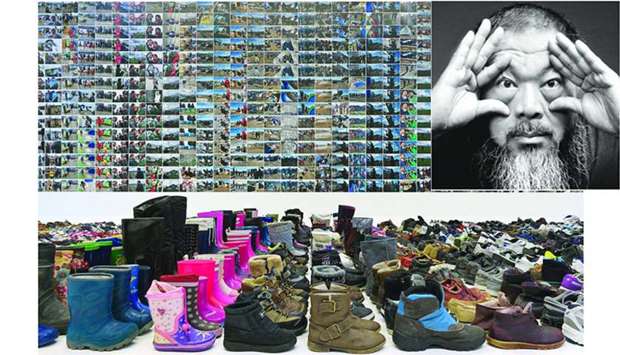*Fire Station’s Garage Gallery to be filled with thousands of garments gathered from refugee camps
Leading contemporary Chinese artist Ai Weiwei will hold his first exhibition in the Gulf region from March 15 to June 1 at the Fire Station’s Garage Gallery, Qatar Museums (QM) has announced.
The exhibition will feature Ai Weiwei’s recent works and one of his most prominent and poignant projects highlighting the plight of refugees, Laundromat (2016), a QM release explained.
The artist’s show in Doha highlights Qatar’s development as a creative and artistic hub that encourages dialogue through artistic expression.
Laundromat also reflects the determination of QM and its chairperson HE Sheikha Al Mayassa bint Hamad bin Khalifa al-Thani to bring the world's leading contemporary artists to the country aimed at inspiring future generations of artistic talent and engage the local community, as well as offer a regional platform to some of the world’s most unique and powerful voices.
The exhibition follows Ai Weiwei’s first visit to Qatar in April 2017 when he discussed his life and work at a packed public event at the Museum of Islamic Art, and met with young artists at the Fire Station.
“It is a real privilege to welcome Ai Weiwei to Doha for his first show in the Gulf. And as home to our community of artists in residence, the Fire Station is the ideal venue,” Fire Station Artist in Residence Programme director Khalifa al-Obaidly said.
“We hope that by bringing international artists to Qatar and exchanging ideas with artists from Qatar and the region, we are able to encourage creative sparks amongst a young generation in the Middle East,” he added.
“We have seen time and again how bringing such figures to Qatar fires the imagination amongst our talented young artists, supporting the country in originating art, culture and heritage experiences from within,” al-Obaidly noted.
Reflecting Ai Weiwei’s continuing engagement with the global refugee crisis, this monumental work brings together thousands of articles of clothing collected from a makeshift refugee camp in Idomeni – a small village in northern Greece and official border crossing to the former Yugoslav Republic of Macedonia.
The camp was shut down in May 2016 and the refugees that had been living there were evacuated, leaving their possessions behind.
Laundromat displays carefully hung clothes and meticulously arranged shoes, each of which have been washed, hung to dry, steamed, sorted and organised. In all, 2,046 items of clothing are displayed alongside personal mementos and photographs.
Laundromat also features the film “Idomeni” (2016) which captures the everyday conditions of the refugees up to the moment when the camp was evacuated; and 17,062 Photos Relating to Refugees 1.12-09.08.2016 – a wallpaper which consists of a selection of images taken by Ai Weiwei on his iPhone during the filming of his documentary feature “Human Flow.”
Alongside Laundromat, other projects by the artist will be exhibited in the Fire Station, including Stacked Porcelain Vases as a Pillar (2016), which represents six themes of the refugee condition — War, Ruins, Journey, Crossing the Sea, Refugee Camps, and Demonstrations; and Tyre (2016), a traditional symbol of safety turned on its head by being crafted from marble and representing the struggle faced by refugees crossing the Mediterranean Sea.
“I decided to follow the refugees’ path”, Ai Weiwei said. “I went to the Idomeni refugee camp. It had become a bottleneck when the flow of refugees entering Europe was completely shut off.”
“Before, refugees would travel through Idomeni on the so-called Balkan route to reach Europe. Once the Macedonian government closed the border, the camp swelled to over 15,000 refugees,” he noted.
“I started to take many photographs, to try to record the moment. The harsh reality can act as evidence and make us reflect on these conditions. This is a situation many people refuse to see, or try to distort or ignore,” Ai Weiwei added. “Many willfully believe this isn’t taking place. When you see so many children out of school – 263 million children worldwide – you can’t easily predict what our future holds.”
Ai Weiwei is renowned for making strong aesthetic statements that resonate with timely phenomena across today’s geopolitical world.
From architecture to installations, social media to documentaries, the artist uses a wide range of mediums as expressions of new ways for his audiences to examine society and its values.
He was born in Beijing in 1957 and currently resides and works in Berlin.

